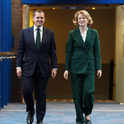A towering monument stands near Loch Shiel where Bonnie Prince Charlie launched the Jacobite rebellion in 1745 but it seems unlikely that there will be any memorial in Manchester Town Hall to mark the rise of the Neo-Jacobites on 2nd October last year.
The event was a packed Conservative conference fringe, organised by the Bruges Group which cemented the legend of Jacob Rees Mogg, helped by an invasion of leftwing protesters. After calmly debating with the socialists before they quietly left, he opened his speech with the confident righteousness that all ideologically driven groups want to hear.
“We don’t need to shout, we don’t need to scream. We need calm considered deliberative discussion and then we can show people that conservative ideas and values are best for this nation.”
A movement in need of a “sound” leader had finally found its man. After the referendum Boris had proven to be too soft on immigration then leadership, Gove untrustworthy, and Farage disappeared stage right pursuing Donald Trump.
The “Jacobite” tag may rile some historical purists, but there are real parallels in the twin movements of (largely) Tory reactionaries. Both share a nostalgic view of a past political order—be it the lost Stuart ascendency, or the years of “Sovereignty” before 1973. Both seek to restore this, by harnessing the power of nationalism, whether that nationalism be that Scottish in 1745 or British in 2018. And then there is the Catholic factor. The old Jacobites hoped for religious freedom from a hard-line Anglicanism in England and Presbyterianism in Scotland. The Neo-Jacobites are not mostly Catholics, but they do want “religious freedom” to be social conservatives about gay marriage, transexuality and abortion, positions which their leaders’ devout Catholicism leads him to. When Piers Morgan thought he trapped Rees Mogg by getting him to give a rigid Catholic anti-abortion stance, he actually fuelled support.
Can Jacob-Rees Mogg become Britain's 55th Prime Minister?
Neo-Jacobites manoeuvres were on display at a recent event addressed by the father of American populist conservatism Roger Stone, a long time friend and advisor to Trump. It was a Bow Group affair which, together with the Bruges Group, is organising the new Jacobite insurgency. It was packed with conservative Conservatives and Ukip members being wooed to join the Tories. Stone’s advice for UK conservatives to “find a leader like Donald,” [might have seemed jarring, given the total contrast in style between the brash Trump and the debonnaire Rees-Mogg], but in truth it was superfluous. Everyone was already talking about how to make Mogg leader.
In February, Peter Harris, London organiser for Ukip, switched to the Tories and many of his colleagues in Barking and Dagenham followed. He quoted Arron Banks: as Tory membership drops to circa 70,000 then 20,000 “kippers” can change the party. While moderates drift away, Neo-Jacobite Conservatism is even attracting some younger activists in places, with Durham now reported to be “Britain’s first Conservative University”.
The Conservative Party is changing. As the Corbynistas can appear to be motivated as much by loathing “the Blairites” as the enemies, so the enemies that obsess the Neo-Jacobites are not so much Corbyn as the “socialist Theresa the appeaser” in Downing Street and “liberal lesbian” leader in waiting Ruth Davidson.
Senior figures sense this, and so frightened of what it could mean for a leadership contest—where the activists enjoy the final say on rules never previously used to pick a prime minister—that some cabinet ministers want to avoid such a ballot. Tory MPs—who get to whittle down the final shortlist of two that goes to the members—are planning to exclude Rees Mogg. However, by then the membership may be so Neo-Jacobite that that his exclusion itself could cause a crisis.
The fear is history will repeat itself in that the old Jacobites' grizzly defeat effectively kept the Tories of office for a quarter of a century. The Neo-Jacobites though think their time has come.
By David Maddox












